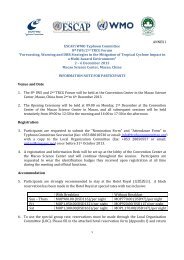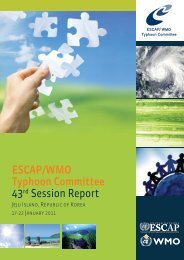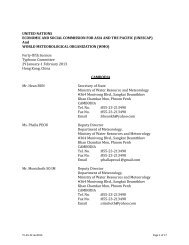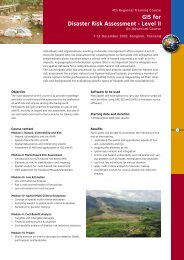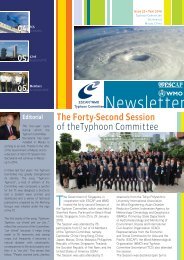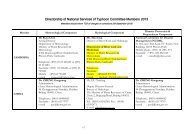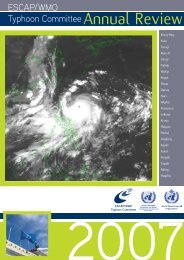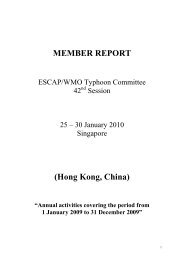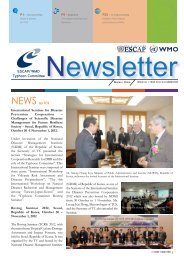TCAR - Typhoon Committee
TCAR - Typhoon Committee
TCAR - Typhoon Committee
You also want an ePaper? Increase the reach of your titles
YUMPU automatically turns print PDFs into web optimized ePapers that Google loves.
54<br />
ESCAP/WMO<br />
<strong>Typhoon</strong> <strong>Committee</strong> Annual Review 2009<br />
d. Research, Training, and Other Achievements/<br />
Results<br />
d-1. Disaster Management Policy Program: Waterrelated<br />
Risk Management Course<br />
To cope with the growing threat of water-related<br />
disasters, there is an urgent need to build an active<br />
network of experts and professionals to deal with the<br />
issues involved, particularly in developing countries<br />
that have proven to be more vulnerable to natural<br />
disasters. Such experts are expected to acquire<br />
a broad understanding of all aspects of disaster<br />
management. In response to this need, ICHARM offers<br />
a master’s degree program called the Water-related<br />
Risk Management Course in Disaster Management<br />
Policy Program, which started in October 2007. This<br />
is a one-year program jointly organized by ICHARM<br />
and the National Graduate Institute for Policy Studies<br />
(GRIPS) with the support of the Japan International<br />
Cooperation Agency (JICA). As of the beginning of<br />
2010, 13 master’s course students were enrolled<br />
in the course, 4 of whom were from the TC region<br />
(Japan, China, Thailand and Philippines).<br />
Figure 17 Management course students for the year 2009-2010<br />
(KRA1, 2, 5, 7)<br />
d-2. Implementation of JICA’s Comprehensive<br />
Management of Rivers and Dams Group Training<br />
Program<br />
The River Bureau of the Ministry of Land, Infrastructure,<br />
Transport and Tourism(MLIT), the National Institute<br />
for Land and Infrastructure Management, PWRI and<br />
JICA have served as implementing agencies for<br />
the JICA Comprehensive Management of Rivers and<br />
Dams group training program that began in 1973.<br />
These organizations have provided engineers working<br />
on flood control administration and water resources<br />
development plans worldwide to give lectures on<br />
the Japanese Government’s flood management<br />
measures. They have also conducted exercises related<br />
to hydrological statistics and runoff analysis, lectures<br />
and exercises on dam design and construction, and<br />
on-the-spot visits to relevant facilities. As of 2009,<br />
engineers had been invited from China, Indonesia,<br />
Iraq, the Philippines, Myanmar, Syria and Pakistan<br />
during the period from September to December for<br />
the training.<br />
Figure 18 Trainees of the program<br />
(KRA1, 2, 5, 7)<br />
e. Regional Cooperation Achievements/Results<br />
e-1. Project for the Development of Flood Disaster<br />
Preparedness Indices<br />
Strengthening disaster preparedness and identifying,<br />
assessing and monitoring disaster risk are issues<br />
highlighted in the Five Priorities for Action under<br />
the Hyogo Framework for Action adopted in Jan.<br />
2005. In many countries, however, assistance from<br />
the central government is often insufficient and<br />
slow when disasters occur. In such cases, raising<br />
the disaster preparedness level of communities/<br />
local governments is an essential part of disaster<br />
management. However, there are no widely<br />
recognized indicators that can be used for periodical<br />
self-assessment in localities. To fill this gap, this<br />
project was proposed and adopted for implementation<br />
with the objective of improving disaster preparedness<br />
in local governments and communities. In order<br />
to create a well-organized set of indicators, it was<br />
agreed that these would be developed according to<br />
the disaster management cycle enriched based on<br />
feedback from TC members. To this end, ICHARM<br />
developed a crude set of indicators for model trial/<br />
evaluation and launched a new website exclusively<br />
for this purpose (www.fdpi.info) in Jan. 2010. TC<br />
members are currently encouraged to select several<br />
model communities and model-test the proposed set<br />
of indicators using a questionnaire-based approach.



